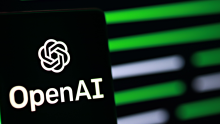ChatGPT4-Questions/User:Darwin2049/Overview
OpenAI - ChatGPT4.
In what follows we attempt to address several basic questions about the onrushing progress with the current focus of artificial intelligence. There are several competing actors in this space. These include OpenAI, DeepMind, Anthropic, and Cohere. A number of other competitors are active in the artificial intelligence market place. But for purposes of brevity and because of the overlap we will limit focus on ChatGPT4 (CG4). Further, we focus on several salient questions that that raise questions of safety, risk and prospects.
Specifically, risks that involve or are:
- Interfacing/Accessibility-Conformability - Synthesis. how will different groups interact with, respond to and be affected by it; might access modalities available to one group have positive or negative implications for other groups;
- Political/Competitive - Synthesis. how might different groups or actors gain or lose relative advantage; also, how might it be used as a tool of control;
- Evolutionary/Stratification - Synthesis. might new classifications of social categories emerge; were phenotypical bifurcations to emerge would or how would the manifest themselves;
Synthesis. Four question groups (indicated above interface, political, evolution and epistemological) are the foundation upon which the analysis as presented follows. Addressing these questions meant acknowledging that they entail both explicit and implicit questions. What do these questions mean? They each point to the question of how the shift in power dynamics will change between existent groups. Put simply, regarding a relative balance of benefit - which group(s) gain vs. which groups lose:
- zero-sum game – who gains advantage, and who loses advantage;
- non-zero-sum game - what group(s) is/are a primary benefactor, what associated groups might also gain as a result; conversely, what group(s) loses benefit, and what associated groups might also lose as a result;
- internals (operations) - would understanding the internal mechanisms of CG4 offer insight into how one group might gain or lose advantage? might understanding how do similar Deep Learning systems work and what do they do offer insight as well?
Addressing these question indicated that making a short survey of reporting with the intent to gauge the reported sentiment might offer some insight. The results suggested four major categories. These sentiments included:
- positives: they favor continued advances
- worried: some were cautious or actually worried about it;
- alarmed: this group is alarmed and petitioned for government intervention;
- hair on fire: rapid advances and incorporation; being overtaken by a rival is unacceptable;
The way that these sentiments were categorized in terms of risk involved describing the kind of risk that each seemed to be either stating explicitly or implying.
Framing the observable sentiment into categories made describing CG4 into risk categories became considerably easier. Three primary categories emerged: systemic, malicious and theoretical. The category of theoretical obliged the recognition that CG4 is inherently dual-use. The result was the category of risks that included risks that are:
- systemic: risks arise that are simply because the new technology exists; no one has intended for it to cause problems, but it did or does;
- malicious: people with mal intent will recognize this development to further an already malicious agenda; they will replace what they have been using with this more sophisticated capability;
- theoretical: this is a somewhat less straightforward delineation because CG4 technology is inherently dual use; it can be used for beneficial purposes as well as dangerous or deadly purposes; in this regard it is like fire;
- speculative: a further examination explores what might develop as these new technologies consolidate themselves.
- black swan events. Strictly speaking these are events of low to extremely low probability. The pending release of the IBM IBM Quantum System Two can probably be categorized as a before/after event. Something comparable to a black swan event. When combined with LLM’s and related deep learning systems the results will be nothing short of ground breaking.
Sentiment
Operation
RISKS - Systemic
RISKS - Malicious
RISKS - Theoretical
Caveats
Recalibrations
Intermediate Synthesis
Speculations
Conclusions
Note & References
Back to root page: ChatGPT4-Questions
